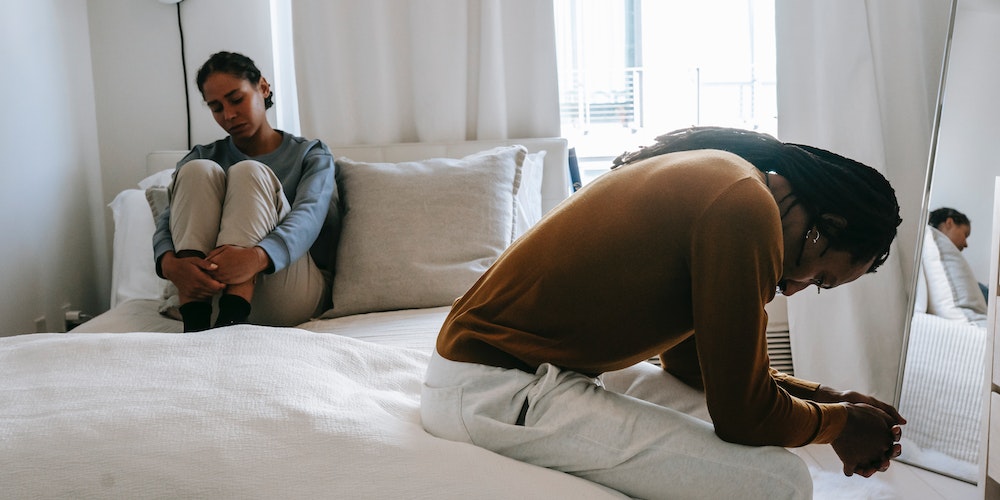In this article, we’ll discuss how to choose love over fear and overcome relationship anxiety.

Introduction
Relationships are an integral part of human life, offering companionship, support, and love.
However, many individuals experience relationship anxiety, which can hinder their ability to fully embrace and enjoy love.
In this article, we will explore the concept of how to choose love over fear and provide practical tips on overcoming relationship anxiety to build healthier and more fulfilling connections with our partners.
Understanding Relationship Anxiety
Now let’s talk about relationship anxiety and how it can impact your relationship.
What is Relationship Anxiety?

Relationship anxiety is a form of fear or unease that arises when we enter into or contemplate romantic relationships.
It can manifest as doubts about our partner’s feelings, fear of rejection, or concerns about the future of the relationship.
The Impact of Relationship Anxiety
Relationship anxiety can have a detrimental impact on both partners, leading to emotional distress, communication problems, and even the breakdown of the relationship.
Acknowledging and addressing these anxieties is crucial for fostering a successful and lasting partnership.
Embracing Vulnerability
Embrace Self-Love
One of the key steps in overcoming relationship anxiety is cultivating self-love and self-compassion.
By acknowledging our worth and accepting ourselves wholly, we can develop stronger emotional foundations to navigate the uncertainties of relationships.
Communicate Openly
Open communication is the backbone of any healthy relationship.
Share your fears and concerns with your partner, allowing them to understand your struggles and provide support.
Honest conversations can strengthen the bond and alleviate anxieties.
Recognizing Fear Patterns
Identify Past Baggage
Past experiences can significantly impact our current relationships.
Reflect on past traumas or negative experiences and recognize how they might be influencing your present fears.
Seeking professional help, such as therapy, can be beneficial in processing and healing these wounds.
Challenge Irrational Thoughts
Fear often leads to irrational thoughts and assumptions about our partner’s intentions or feelings.
When these thoughts arise, challenge them by evaluating the evidence and considering alternative perspectives.
Building Trust and Security
Nurture Trust
Building trust is crucial for a healthy relationship.
Trust your partner’s intentions and actions, and avoid letting fear dictate your reactions.
Trust is earned over time, and by giving it a chance, you create the space for love to grow.
Create a Secure Environment
Establishing a sense of security in the relationship is essential.
Show appreciation for each other, practice acts of kindness, and be dependable and reliable.
A secure environment fosters emotional safety, allowing love to flourish.
Embracing Uncertainty
Accept Imperfections
No relationship is perfect, and embracing imperfections is a part of how to choose love over fear.
Acknowledge that both you and your partner have flaws and that growth comes from navigating challenges together.
Embrace Change
Change is inevitable in any relationship. Embrace it as an opportunity for growth and learning, rather than something to be feared.
Letting go of the need to control everything can liberate you from anxiety.
Embracing Mindfulness and Self-Care
Practice Mindfulness
Mindfulness involves being present at the moment and non-judgmentally observing our thoughts and feelings.
By practicing mindfulness, we can become more aware of our anxieties and learn to respond to them with compassion and understanding.
Engage in Self-Care
Taking care of ourselves is essential for maintaining healthy relationships.
Engage in activities that bring you joy, relaxation, and fulfillment.
Prioritize self-care to recharge emotionally and reduce relationship anxiety.
Seeking Support
Lean on Loved Ones
Don’t hesitate to lean on your support system—friends, family, or mentors.
Sharing your feelings with trusted individuals can provide valuable insights and reassurance.
Consider Professional Help
If relationship anxiety persists and significantly affects your well-being, seeking professional help is a wise step.
A therapist or counselor can guide you in navigating your emotions and developing coping strategies.
Letting Go of Control
Release the Need for Control
Relationship anxiety often arises from the desire to control outcomes and situations.
Instead, focus on what you can control—your actions, emotions, and responses.
Letting go of unnecessary control can lead to a more harmonious partnership.
Trust the Process
Understand that relationships are a journey of growth and learning.
Trust the process and have faith that, with time and effort, both partners can work together to create a fulfilling and loving connection.
Forgiveness and Compassion
Forgive Yourself and Your Partner
Everyone makes mistakes, and harboring grudges can exacerbate relationship anxiety.
Practice forgiveness towards yourself and your partner, and approach challenges with compassion.
Cultivate Empathy
Empathy is the ability to understand and share the feelings of another.
Cultivate empathy in your relationship, and be willing to listen and support your partner through their anxieties as well.
Conclusion
Choosing love over fear in relationships is a transformative decision that requires self-awareness, open communication, and vulnerability.
By embracing mindfulness, self-care, and seeking support when needed, we can overcome relationship anxiety and create a strong foundation for lasting love.
Remember that every relationship will have its ups and downs, but with the right mindset and a commitment to growth, love can conquer fear and lead to a more profound and fulfilling connection.
Frequently Asked Questions
Q: What causes relationship anxiety?
A: Relationship anxiety can be caused by past traumas, fear of rejection, attachment styles, and unresolved emotional issues.
Q: Is it normal to have relationship anxiety?
A: It is normal to experience some anxiety in a relationship, but when it becomes overwhelming and hinders your emotional well-being, it’s essential to address it.
Q: How can I communicate my fears to my partner?
A: Choose a calm and private setting to have an open conversation. Use “I” statements to express your feelings and avoid blaming or accusing your partner.
Q: Can therapy help with relationship anxiety?
A: Yes, therapy can provide valuable insights and tools to overcome relationship anxiety and build healthier connections.
Q: Is it possible to fully overcome relationship anxiety?
A: While it might not completely vanish, with dedication and effort, relationship anxiety can be managed and significantly reduced, allowing for a more fulfilling partnership.
Q: Can relationship anxiety be a sign of an unhealthy relationship?
A: Relationship anxiety can be a natural response to the vulnerability and emotional investment in a relationship. However, if it becomes overwhelming and persistent, it may indicate deeper issues that need to be addressed.
Q: How long does it take to overcome relationship anxiety?
A: The time it takes to overcome relationship anxiety varies from person to person. It depends on individual circumstances, the extent of anxiety, and the willingness to work on personal growth and communication.
Q: Are there any books or resources to help with relationship anxiety?
A: Yes, several books and resources focus on relationships and anxiety management. Some popular ones include “Attached” by Amir Levine and Rachel Heller and “The Anxiety Toolkit” by Alice Boyes.
Q: Can relationship anxiety lead to the end of a relationship?
A: Untreated and unaddressed relationship anxiety can strain a partnership to the point of a breakup. However, with open communication and mutual effort, many couples can overcome these challenges and grow stronger.
Q: What are some daily practices to reduce relationship anxiety?
A: Engaging in daily mindfulness exercises, journaling your thoughts and feelings, and expressing gratitude for your partner and relationship can help reduce relationship anxiety and foster a more positive outlook.



